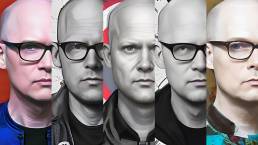
I know I said I’d try to stay away from the wretched AI art debate, but it’s raining and blah outside, so I briefly tuned in to this “AI/ML Media Advocacy Summit.” However I bailed after about half an hour. Participants couldn’t seem to move beyond the reductively polar Twitter AI Debate postures of “Absolute Moral Panic” vs “Progress Marches On.” Nobody seemed to cover anything close the reality of how a veteran creative professional like me has been using these tools.
The whole controversy over AI art has degenerated into a nuance desert. I’m seeing more and more “we’re not using AI art ever and we think anyone who does is bad and should feel bad” statements by various companies, as well as various artists and writers, and I know no one asked for my take but I’m not going to make statements like that. However I will say “I am an artist and a writer with an English BA and 20 years of professional design experience who sometimes uses AI art apps as one tool in my creative toolset for personal projects (but not client work).”
Because I do use them and I’m not sorry. One of the creative things I’ve done for fun in the past several months is create character portraits by combining AI-generated images with substantial alterations using my own human skills acquired over decades. What I’m doing is basically glorified retouching, but It feels like something new. Even so, the vibe I get from the “grab a pencil” crowd is that it’s irreparably tainted because of how it began.
Some may consider that highly problematic, but my position feels more complicated than the omnidirectional outrage of AI art detractors and condescending tech-splaining of AI art advocates. Reductive, reactive, and judgmental cultural litigation is just how everyone is wired these days, so I’m probably Good or Bad now according to your priors, but the entire topic feels way more complex than most people on either side of the issue are making it out to be. It feels super-unhelpful to impose an either/or judgmental framework, especially via social media’s Two Minute Hate engine.
Nevertheless it also feels like a hard call, because most AI art advocates aren’t doing themselves—or me—any favors. None of their arguments can rebut the central problem of art scraping for machine learning. Their profoundly bizarre utopian statements and sentiments about AI art that I’ve seen on socials or in Discord echo the worst, most tone-deaf dissembling about (take your pick) cryptocurrency or NFTs or “the metaverse” or the overall idea that Big Tech is a force for good, working on saving humanity from itself. This is wild-eyed evangelism at its most blinkered, and unfortunately I may not be able to use these tools without being lumped in with such absolute weirdos.
It may be irresponsible or immoral or whatever but I’m less concerned with the why or the how of this stuff. That toothpaste is out of the tube and it’s not going back. Despite its dubious provenance, I don’t really care how the tech works compared to how I create something, except that in both cases, neither it nor I work best from blank canvases. My concern is with the “if,” as in “if I include this tool as one additional piece of my toolset, and create something ‘new’ that incorporates aspects of AI-generated imagery, will my creative career and professional reputation unduly suffer because of others’ reactionary judgments? And even if that does happen, what else do I really have to lose as an unemployed freelance creative?
I’m sure that sounds selfish but I’ve tried the opposite—freaking out over every creative industry injustice—and found it both draining and wanting. I’ve learned to be selfish about creativity because if I don’t care about my creativity, no one will. I already put myself out of work when I stopped creating for marketing agencies or even my own defunct business partnership. My design work was commodified years ago by 99designs and Fiverr and someone’s teenage relative who does it for nothing. My current map work is also commodified by Inkarnate. I solve the latter by doing something completely different from conventional hand-drawn hobbit maps, but I assume eventually that my style will be appropriated.
So I guess I’ll just continue being creative. I won’t use AI art in client work, just as I won’t make NFTs. But for personal work or hobbies, anything is on the table if I find it compelling. AI art helps me create composite character portraits exactly how I want to, with my style and ideas determining the final result—not whomever I hired to do it. My process substantially alters what Midjourney gives me, just as my self-published novel synthesized everything I’d absorbed from my written influences, and just as my self-released music synthesized everything I’d absorbed from those influences, famous or obscure. In every case, I made something new, and nobody can take any of it away—neither the tech weirdos nor the torches-and-pitchforks crowd.
I’ve also seen social media gripes about people who do this not being real artists, but the idea that I’m “not a real artist” because I use a certain tool (one of many, in my case), or that I’m narrowly creatively defined by my online portfolio (which changes all the time), is reductively silly and contemptuously disingenuous in its narrow definition of creativity. I am an artist, I always have been, and artists make art (even if it’s that goofy Lensa AI avatar thing, which I used for this post’s hero image). When I was an AIGA chapter president I may have cared too much about superficial crap, but I also emphasized that nobody and no one profession has a monopoly on creativity. Creators create. We’re gonna do it anyway, using whatever compels or inspires us.